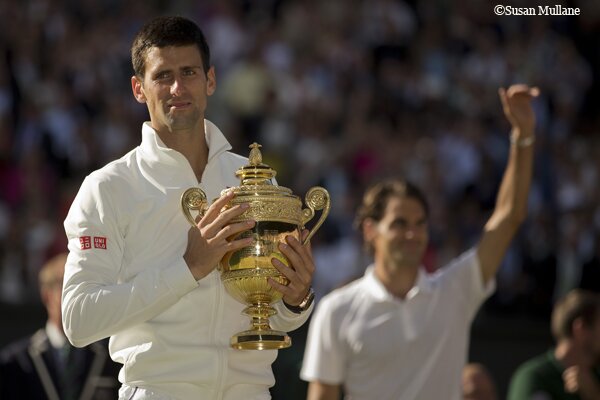By Alix Ramsay
In the end, it was a race to see who would cry first – and, even in that, Novak Djokovic just pipped Roger Federer at the post.
For very nearly four hours, the two men had stood toe-to-toe in one of the best finals Wimbledon has ever seen. There was barely a game that was average or mediocre; from the very first rally, the two of them were running at full speed, hitting the ball with power and precision, creating chances and possibilities and turning defence into attack in a split second. You did not dare take your eyes off either of them for a moment in case you missed the shot of The Championships. But if you blinked, you’d missed another. Neither man deserved to lose and, after three hours and 56 minutes, Djokovic won 6-7, 6-4, 7-6, 5-7, 6-4. And that is when the crying started.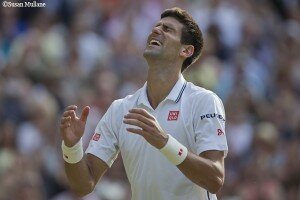
Just a couple of days ago, Djokovic had sounded like a beaten man. Not a ball had been hit yet he was weighed down by his losing record: he had lost five of his last six grand slam finals and he had lost the last three on the bounce. In 2011 he felt invincible; as he approached Sunday’s final, he felt vincible. Very, very vincible.
Still, in sorting through his kitbag as he prepared for the final showdown, he found a relic of the old Novak, the Novak that is a brick wall in human form. This was the bloke who could weather any form of attack and remain standing until the bitter end. This was the Novak who beat Federer and won his second Wimbledon title, regained the world No.1 ranking and finally banished the demons that had haunted him for the past two years. No wonder he was in tears just seconds after Federer dumped his final backhand in the net.
“As I said on the court, I respect him and his achievements, his career,” Djokovic said. “He’s a great champion on and off the court. To be able to win against him as one of my greatest rivals on this occasion on a court that he’s been dominating for so many years makes it a very special trophy for me. I had tears of joy. I was overwhelmed by the moment and the occasion.
“This is very special. Most special grand slam final I’ve played. At the time of my career for this grand slam trophy to arrive is crucial, especially, as I said, after losing several grand slam finals in a row. Started doubting, of course, a little bit. I needed this win a lot. I’m going to try to use it in the best possible way and for my confidence to grow for the rest of my season and the rest of my career.”
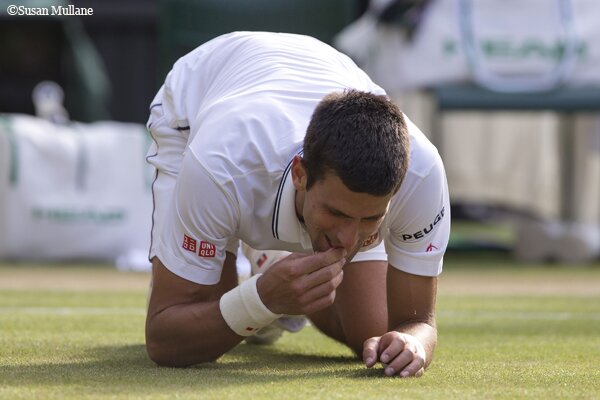 He was in tears as he walked to the net to shake Federer’s hands, he was in tears as he fell to his knees to eat a blade of the Centre Court grass – “the best meal that I ever had in my life, probably.” – and he was in tears when he was given the trophy.
He was in tears as he walked to the net to shake Federer’s hands, he was in tears as he fell to his knees to eat a blade of the Centre Court grass – “the best meal that I ever had in my life, probably.” – and he was in tears when he was given the trophy.
Federer held it together just a little longer. He only started blubbing when he was holding the runner’s-up silver salver and was listening to the new champion talking to Sue Barker. For him, it was a bitter pill to swallow. He knew he was fit, he knew he had played his heart out and he knew he had been just a couple of points away from making the trophy his. But he didn’t. And it hurt.
Just to make matters even more difficult, he walked off court and straight into the Duke and Duchess of Cambridge – or Wills and Kate, as he knows them – who were waiting for him in the clubhouse.
“I wasn’t in a great state,” Federer said. “I was unbelievably sad at that moment just when I left the court, so it was a difficult moment for, I think, the three of us. But they were very sweet to comfort me and wish me well, that they enjoyed the match and all these things. We met previously, so that helped, I think.
“Clearly it makes me very happy to see them being supportive of my game and supportive of tennis. Overall, it’s really nice seeing them there at a Wimbledon finals. Also at the quarters I think they were there as well. I think it’s wonderful.”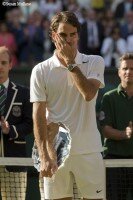
Normally in five set matches, there are ebbs and flows, lulls and the odd one-sided set. Not this time. There was nothing between them in the first set, one break of serve (Djoko just nicked it with a belting pass) in the second set, little to separate them in the third set and then, finally – finally – Federer broke the Djokovic serve after two hours and 41 minutes in the fourth. But, by then, he was already a break down. His moment of triumph was all too brief, though, as Djokovic broke again.
Fed hung on to hold for 5-3 and made Djokovic serve for the match. Now the chips were down. Fed broke again. But Fed then faced a break point, a championship point. Fed served an ace. There was a challenge from Djokovic. Hawk-Eye, the technological interloper that Federer hates, called in Fed’s favour. After three hours and three minutes, the seven-time champion had been let off the hook. In all, the mighty Fed won five games on the trot to save the fourth set and 10 minutes after saving that championship point, he was kept waiting as Djoko marched off court for a pee-break before the start of the fifth to try and clear his head. What had just happened? How was not already the Wimbledon champion?
For all his mental frailties over the past couple of years, Djokovic had a mind like a steel trap against Federer. He came back in that fifth set, regrouped, refocused and, serving first, dug in for battle. To win this match, this match all matches, would mean the world. If he could close this out, he would know that he was a true champion again. And he won. He hung on. He believed in himself and he won.
“I was very close in several occasions, even in the fourth, to win the match,” Djokovic said. “But I could have easily lost my concentration in the fifth and just handed him the win. But I didn’t, and that’s why this win has a special importance to me mentally. Because I managed to not just win against my opponent but win against myself as well and find that inner strength that got me the trophy today.
“I think the biggest difference from Wimbledon this year and last year is mental, it’s not really physical. Yes, I had a tough five‑setter against del Potro in the semis last year. Maybe I looked tired but I wasn’t tired in the finals. Emotionally I just wasn’t there. I wasn’t at my best. I think that this year everything got together. Emotionally, physically, mentally, I was on the top of my abilities. That’s what got me the trophy.”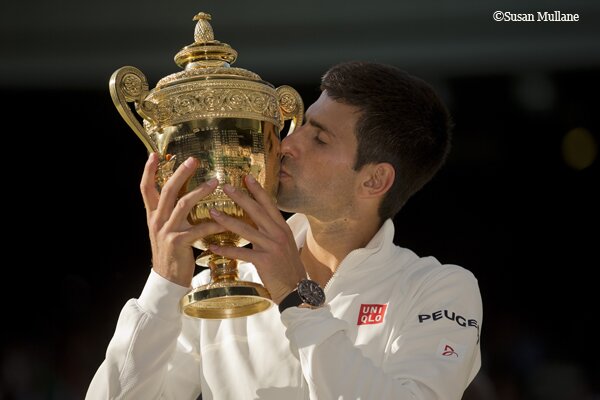
He dedicated his win to his fiancée, Jelena Ristic – whom he will marry this coming week – to his family and his team (including Boris Becker who, finally, has been with him when he has won a title). Most important of all, he dedicated the victory to his very first coach, Jelena Genic, the woman who took him under her wing when he was just a wee scrap of a lad.
“I dedicate this to my first coach who taught me everything about tennis and about behaviour,” Djokovic said to Sue Barker. “She passed away last year and this is for her.”
He had wanted to win the French Open for her last summer but Rafa had stopped him in the semifinals. It had all been downhill from there but now he had the biggest grand slam trophy of them all to dedicate to the two Jelenas in his life.
This time next week he will be a married man. In four months’ time, he will be a dad. And now he is a grand slam champion again. No wonder he was in tears.



 06 Jul 2014
06 Jul 2014  Posted by Alix
Posted by Alix
